#1919 strike
Explore tagged Tumblr posts
Text
A hundred years ago, Ethel Barrymore was instrumental in the 1919 Actor's Equity Strike, getting rights and pensions for elderly and infirm actors, at great personal cost.
She would be ashamed that Drew is a scab.

#drew barrymore#ethel barrymore#writer's strike#actor's strike#drew barrymore is a scab#wga strong#wga strike#support the wga#wga solidarity#i stand with the wga#writers strike#sag aftra#sag afra strike#actor's equity association#1919 strike#scab
70 notes
·
View notes
Text


Mitzi's costume design for "Ingenue", and some of the ~1919-1921 catalog fashions that inspired it. Everything is always in transition fashion-wise, but it's interesting to see the very defining rectangular shape of the 1920s start to emerge from post-Edwardian/WWI era style. (The contrast in how comparatively modern things looked by the latter part of the 20s is pretty striking.) Design by me and L. Frostad, who did the finalized character sheet! ------------------------
Lots of character designs, extras, and other behind the scenes stuff are on the Lackadaisy Patreon!
#lackadaisy#lackadaisycats#1920s#character design#historic fashion#cats#character art#animation#indie animation
7K notes
·
View notes
Text
I don’t know where I’m going with this paper 0_0
#it's due saturday and I have nothing I'm making it up as I go#much like the seattle general strike of 1919 which had no clear stated end goals hmmm... is this my thesis
1 note
·
View note
Text
Alla Nazimova dressed as a rabbit in The Brat (1919)

Scary Easter by Alla Nazimova
#historical hollywood#old hollywood#alla nazimova#the brat#1919#1910s#silent era#holidays with hollywood#happy easter!#strike a pose#let us play at dressing up#some bunny to love
34 notes
·
View notes
Text
during WW1, the British government was so scared of socialism that it decided to build 500,000 spacious and good quality homes for the higher strata of blue collar workers, in order to avert any chance of revolution. this would give jobs to many of the demobilised troops and would stop a large section of the proletariat agitating about their living conditions. previously, the government had steadfastly refused to interfere in the freedom of the housing market, despite large sections of the population living in slum housing
as Major Astor of the Local Government Board told parliament during a debate on the scheme:
“When we talk of expense and cost let us realise that everything is comparative, and let us measure the cost of our housing proposals by the cost of Bolshevism to the country and the cost of revolution. The money we propose to spend on housing is an insurance against Bolshevism and revolution. What is the cost to the country of industrial unrest and strikes? You have only to realise the conditions under which many men and women live to realise that unrest is fully justified.”
believe it or not, revolution was seen as a serious threat. this is how the minutes record the PM, David Lloyd George, speaking in a Cabinet meeting on March 3rd 1919:
“In Europe we were now faced with very serious conditions. Russia had gone almost completely over to Bolshevism, and we had consoled ourselves with the thought that they were only a half-civilised race; but now even in Germany, whose people were without exception the best educated in Europe, prospects are very black.
“Bavaria was already in chaos, and the same fate might await Prussia. Spain seemed to be on the edge of upheaval. In a short time we might have three-quarters of Europe converted to Bolshevism. None would be left but France and Great Britain.
“He believed that Great Britain would hold out, but only if the people were given a sense of confidence—only if they were made to believe that things were being done for them. We had promised them reforms time and again, but little had been done. We must give them the conviction this time that we meant it, and we must give them that conviction quickly.”
this is what communists mean when we say that the capitalist state only gives out concessions when its power is under threat
read more about the Homes Fit for Heroes initiative and its politics
1K notes
·
View notes
Text
Hm. Don’t like that.
#reading an unfinished manuscript of a memoir of working in the theatre in the 1910s#this man (boy he was 16-18 years old when this happened this BOY)#was clearly taken advantage of by this prominent producer#it’s not written in a way that explicitly says it but it’s making me sick to my stomach#because it aligns with similar incidences#and one quick google search told me that said producer likely did the same thing with a number of boys/young men#and this is the 1900s-1910s#so#same shit different year#and the other thing is I know exactly what it was like#i remember this kind of shit happening#it happened to me#not in exactly the same way#but in all the ways that matter#and this my friends is why AEA is important#because guess what this memoir also includes the 1919 actors strike#past life#what do you do with a ba in theatre#museum musings
1 note
·
View note
Text
moth. teaser. (e.w.)


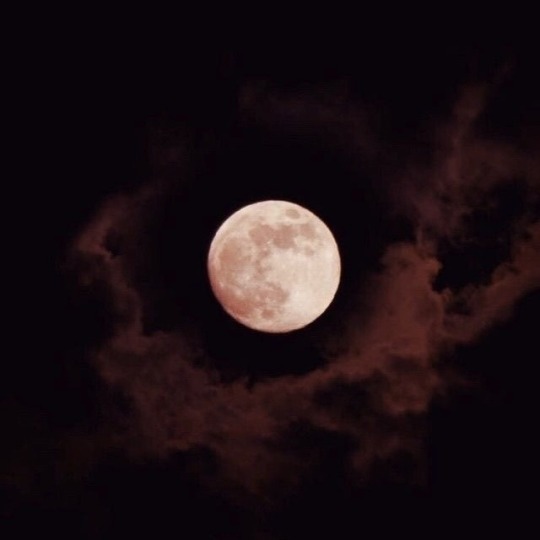
SYNOPSIS: knights of the devil, you all are to be conquered.
WORD COUNT: 881
WARNINGS: vampire!ellie, vampirekiller!oc, a lot to come FUCK, violence… so blood(drinking), death, murder, gore, religion briefly,
A/N: yasss yaaas taglist?
prolouge

1809
“Oh, my precious darling…”
Red, similar to her hair; palms painted from the tips of a finger to the points of elbows; knees sunk into begrimed pili drenched with fresh maroon. Panicked breaths are accompanied by prayers, wishes of denial. Desires for death.
“… What I would give to protect you…”
“F-F—“
Tortured hollers are directed towards the pouring skies. Bodies. Bodies everywhere; surrounded by decay.
She sobs, deep from the pits of her stomach, “Father, for-forgive them! For they do not—“
Thunder claps. Lightning is being used as weapons from the Lord above, all meant to discover her and strike. The beams in the sky are intended to punish her discernment. It was a mistake. It was a mistake! Her eyes refuse to meet the battered corpse of the young babe, no more than three. Her crime was committed in a haze, blinded by starvation, all at the cost of the family before her. Villagers would deem the view a savage attack. A mutilation only made possible by the ravenous wolves after dark. The bears that protect the trees at dusk.
All on horseback, the strangers paused their ventures to inquire guidance. She swiftly became an aid for navigating the path, instructing them with a trembling finger and a blistering throat. Follow that trail to the end of the woods. Unbeknownst to their gracious eyes, she followed. Stalked after their mount for miles like the thoroughbred they ride, carried by the wind. Urged by bloodlust.
Her vision blurred when they tied their horse’s lariats to a nearby post that barely passed the trees. Her vision was shrouded in darkness, a substance so thick that her limbs felt trapped, even in frantic movement. They’d reached the end, just like she’d promised.
Their screams satiated her hunger, but never hindered her guilt.
Demons, I tell you! All of them, demons! Witches destined to be set aflame for the masses!
And now she crouches over them with remorse in her chest. Remorse that will wash away her like the rainfall that pounds on her shoulders. Much like it had in the past when her purity was stolen. Another fatality.

1919
“Hunting requires bouts of unwavering dedication. If the entirety of your being doesn’t relish in the suffering of the demons walking, then you are to be shunned.”
Being the youngest hunter-to-be amongst legends, historical monuments that leave trails of prosperous victories wherever they advance, is humbling. Your mother pestered you for as long as you could remember: never, never become a hunter, being her only protest for you, her only child. She used to pray beside your bed at night when she assumed you to be asleep, praising the Creator for forbidding you sickness or poverty. You were her only treasure, a gift from the frosted heavens.
And the demons took her.
Hunters searched the unoccupied lands that surrounded your home relentlessly, but no traces of the Devils’ were ever discovered. They attended your mother’s burial for your protection, and prepared to assist your transition into the orphanage, but you denied. You were permanently vexed. Forever vengeful.
I wish to become a hunter!
Your recruitment was immediate due to the shortage of volunteers, and that same day, you witnessed all of the treasures and memories of your childhood home — of your mother — get burned to the ground by the Hunters. No trails for the demons should go untouched by fire.
“If you hesitate for even a second, you’re dead. Either by their hand…”
Something unsettled you that morning as you prepared for school. Something in the air, something underground. A heaviness in your home that you couldn’t trace. Your mother ironed your skirt and pinned your hair up, brushed down the small curls around your hairline, and she eased you. The weather is changing, dear, she’d said before wishing you well. You studied relentlessly, all while she was shredded by teeth sharp as knives. You want the Devil’s lifeless heart in the palm of your hand, risks be damned.
“Or mine. And I will not hesitate.”
The overseer of your battalion, who slowly paces before his future prodigies, aura menacing, pauses in front of you. With your gaze locked forward and a lump in your throat, you gawk right on the crescent on his belt — the hunter’s insignia — your feet shuffle, shoes slightly squeaking above the wood.
“Are you prepared, child?”
His tone is disparaging, and you swallow. Your head bobs and your breathing stutters.
“Yes, sir.”
He crouches before you and your cells stiffen, elbows perched on his knees, eyes finally level with yours. You appear stoic due to the grinding of your teeth, inspecting the stitched scar that sprouts at his right brow and crosses his eye.
“You are nothing,” He hisses, and your heart clenches, “You are not a child, and I am not your elder. Any identity you held prior to your arrival is worthless, now. We are vessels for the greatest power above. Hunter is your only name, do you understand?”
No verbiage escapes you. It couldn’t with how your breath trembles, so you nod once; Quite mechanic.
“Stand straight.”
His conviction forces your shoulders into alignment, and snickers from the older prodigies erupt from behind you. Your cheeks warm and your palms drip. The overseer rises to his feet once more.
“That goes for all of you!” He shouts, and the room is quiet.
The crescent sparkles under the yellow candlelight. Your palms grow clammy at his viperous swear.
“I will not hesitate.”

#vampire!ellie#ellie williams#ellie williams smut#ellie williams angst#ellie williams au#ellie williams x reader#ellie the last of us#ellie x reader#ellie tlou#works 𖧧࣪#lesbian
197 notes
·
View notes
Text
More random details from the depths of RE8
With the excuse of trying some shiny new mods, I've been replaying RE8 lately for the umpteenth time. Given the number of hours I've already poured into this game, you'd really think there'd be nothing left to find by this stage ‒ yet here I am, finding still more details I'd somehow missed the first half-dozen times through.
For one, there's the fact you can actually find Eva's grave in the graveyard outside the church. As the only photo we ever see of her shows her as a baby, I'd assumed she was still a baby when she died, but turns out, she was ten years old.
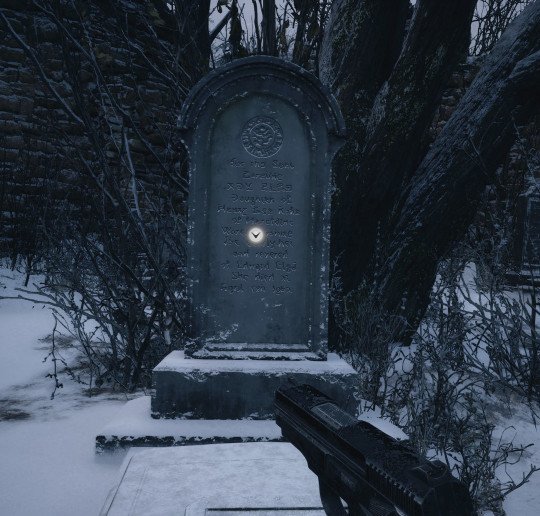
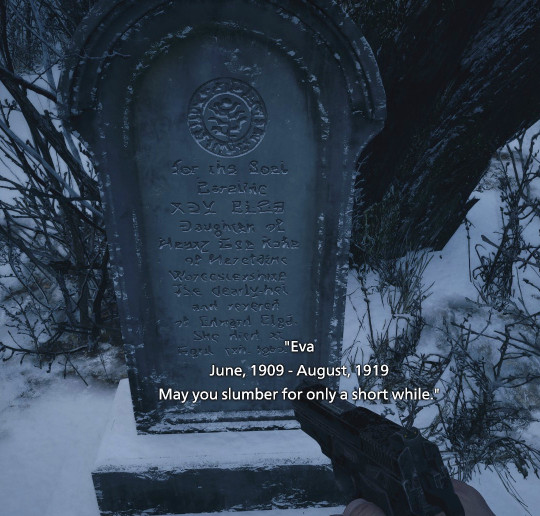
"Eva, June 1909 ‒ August 1919
May you slumber for only a short while"
As expected, her death of the Spanish flu took place in 1919. There's some semi-legible text on the stone, but it doesn't match the caption ‒ it's just the same generic filler text you'll find on half the gravestone assets in this game.

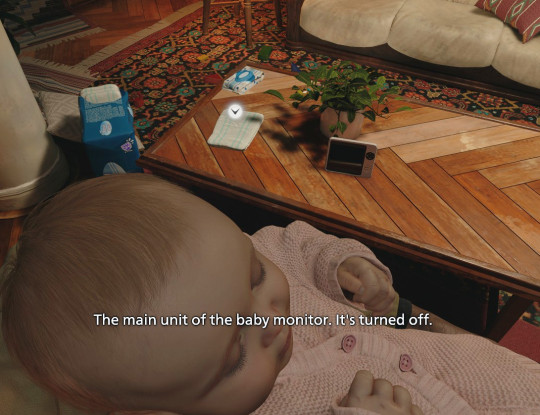
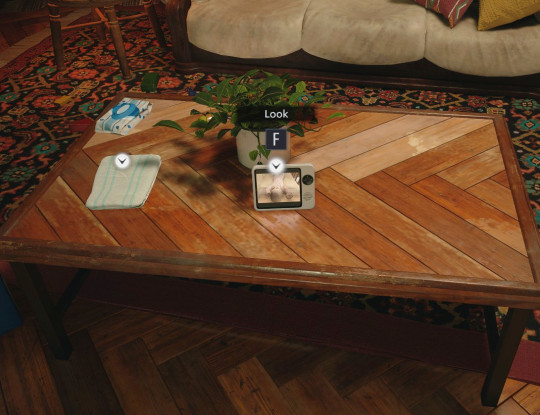
For another, there's Rose's baby monitor. I'd noticed Ethan turning the thing on when he puts her to bed, and even found the assets for its screen ‒ but since I'd never found the monitor itself, I assumed they must be unused.
Until this playthrough, when suddenly I'm just like, oh, there it is, sitting right on the table. You can even interact with it!
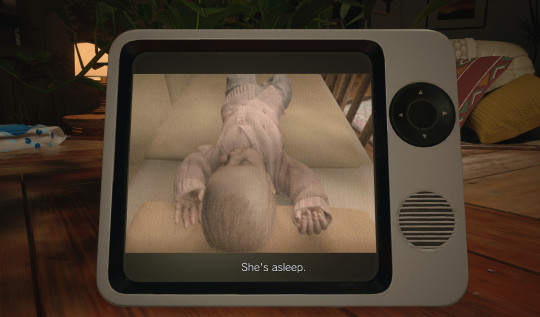
How did I miss this so many times? It is pretty easy to overlook, given you'll trigger the cutscene with Mia if you go much closer to the kitchen, but I'm still surprised I never spotted it before. (And you do have to wonder if there was ever any plan for it to show a glimpse of something more sinister than just a still-image of Rose sleeping.)
In other minor details, there's the bit where Ethan arrives on the outskirts of the village at 8AM. You can hear a clock striking 8 times as you get your first view of area.
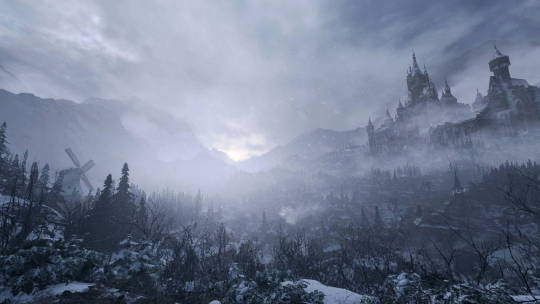
Granted, this is not going to excite anyone who hasn't spent as long as I have putting together an hour-by-hour timeline of everything that happens in this game, but I still do love that they give you enough detail that that's even possible ‒ and this new timestamp fits right into that timeline. (And why yes I have just gone back and updated that post, what do you take me for?)
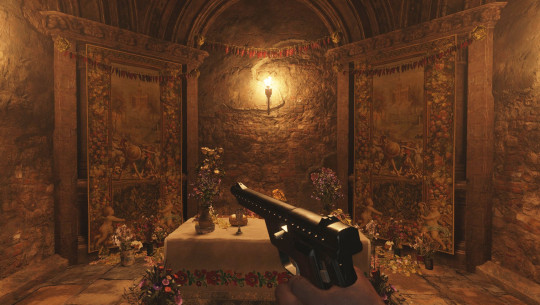
Speaking of assets I thought were unused, you know that hidden room under the castle you can't get into until later, where you have to solve a puzzle that involves setting a moroaica on fire? Have you ever looked closely at the tapestries decorating this place? Because I found them in the game files ages ago, and have been trying to figure out if they're actually in the game ever since.
Because seriously, look at these things!
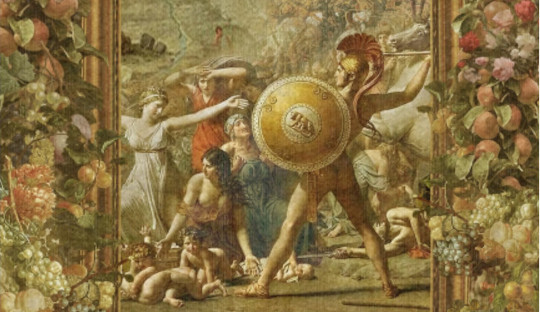
Yes, that is a indeed a man with a sword and spear, wearing a hoplite helmet and sandals and nothing else. And the women seeing him from the front seem to be having a whole range of reactions to all that, er, weaponry being brandished their way. Isn't fine art wonderful?
Another asset I'd innocently assumed was unused is this wonderful bit of bullshit which was labeled simply 'antibow'. It wasn't until I took a long look at it that I realised what they meant was more like 'anti-B.O.W.', as in Bio-Organic-Weapon.
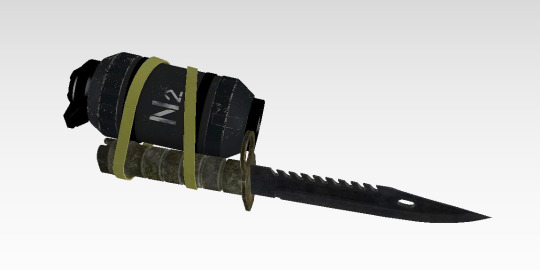
Yes, that is indeed a knife taped to some kind of grenade. Sure is one high-tech outfit we're working with here!
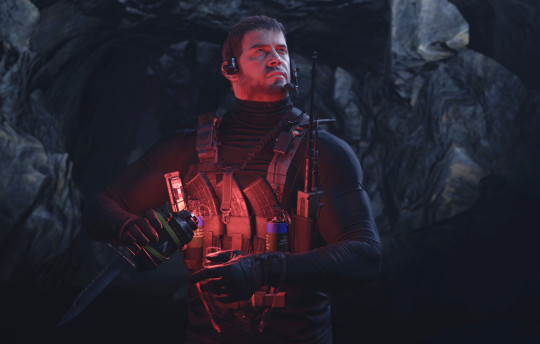
Only now do I spot that this is actually the bomb Chris chucks at the Megamycete in the cavern. It doesn't even come with the knife already attached, he just kind of sticks the knife onto the bomb and presumably straps some tape around them while the camera cuts away.
I still have so much more to share from my ongoing free-camera adventures, but I think we'll leave this one there for today.
#Resident Evil Village#Rosemary Winters#Ethan Winters#Eva#Mother Miranda#Chris Redfield#RE assets#RE lore#Resident Evil#ununsed assets
154 notes
·
View notes
Text

Naomi and Ruth
Artist: Evelyn De Morgan (English, 1855–1919)
Date: 1887
Medium: Oil on Canvas
Naomi and Ruth
The story of Naomi appears in the Bible in the book of Ruth. Naomi lived during the time of the judges. She was the wife of a man named Elimelech, and they lived in Bethlehem with their two sons, Mahlon and Kilion. Naomi’s life illustrates the power of God to bring something good out of bitter circumstances.
When a famine hits Judea, Elimelech and Naomi and their two boys relocate to Moab (Ruth 1:1). There, Mahlon and Kilion marry two Moabite women, Orpah and Ruth. After about ten years, tragedy strikes. Elimelech dies, and both of Naomi’s sons also die, leaving Naomi, Ruth, and Orpah widows (Ruth 1:3–5). Naomi, hearing that the famine in Judea was over, decides to return home (Ruth 1:6). Orpah stays in Moab, but Ruth chooses to move to the land of Israel with Naomi. The book of Ruth is the story of Naomi and Ruth returning to Bethlehem and how Ruth married a man named Boaz and bore a son, Obed, who became the grandfather of David and the ancestor of Jesus Christ.
The name Naomi means “sweet, pleasant,” which gives us an idea of Naomi’s basic character. We see her giving her blessing to Ruth and Orpah when she tells them to return to their mothers’ homes so that they might find new husbands: she kisses them and asks that the Lord deal kindly with them (Ruth 1:8–14). But her heartache in Moab was more than Naomi could bear. When she and Ruth arrive in Bethlehem, the women of the town greet Naomi by name, but she cries, “Don’t call me Naomi... Call me Mara, because the Almighty has made my life very bitter. I went away full, but the Lord has brought me back empty. Why call me Naomi? The Lord has afflicted me; the Almighty has brought misfortune upon me” (Ruth 1:20–21). The name Mara means “bitter.” The cup of affliction is a bitter cup, but Naomi understood that the affliction came from the God who is sovereign in all things. Little did she know that from this bitter sorrow great blessings would come to her, her descendants, and the world through Jesus Christ.
Ruth meets a local landowner, Boaz, who is very kind to her. Naomi again recognizes the providence of God in providing a kinsman-redeemer for Ruth. Naomi declares that the Lord “has not stopped showing his kindness to the living and the dead" (Ruth 2:20) Seeing God’s hand in these events, Naomi encourages Ruth to go to Boaz as he slept in the threshing floor in order to request that he redeem her and her property. Naomi’s concern was for Ruth’s future, that Ruth would gain a husband and provider.
Naomi’s bitterness is turned to joy. In the end, she gains a son-in-law who would provide for both her and Ruth. She also becomes a grandmother to Ruth’s son, Obed. Then the women of Bethlehem say to Naomi, “Praise be to the Lord, who this day has not left you without a guardian-redeemer. May he become famous throughout Israel! He will renew your life and sustain you in your old age. For your daughter-in-law, who loves you and who is better to you than seven sons, has given him birth” (Ruth 4:14–15). Naomi was no longer Mara. Her life again became sweet and pleasant, blessed by God.
#naomi#ruth#landscape#women#book of ruth#old testament#christian art#christianity#bible story#emily de morgan#english painter#european#19th century painting
67 notes
·
View notes
Note
I had a random gut feeling that if writer and actor strikes in USA continues, capitalists may start using their pundits to incite fascists to go after the protesters. Your opinion on this perspective?
We don't know about that Anon, that seems a bit far-fetched. It's not like fascists have a 100+ year history of attacking strikers and trade unions. Unless of course you count Benito Mussolini hiring out his blackshirts as strikebreakers in 1919. Or the fascist attacks & disruptions of the 1926 general strike in the UK. Or Hitler making trade unions illegal in 1933 and then sending trade unionists to be murdered in concentration camps. Anyways, that's all ancient history and there are no examples of recent fascist activity targeting trade unions. Aside from the fascist attack on striking railway workers in Manchester in 2019. Or the murder of Bolivian miner union leader Orlando Gutiérrez in 2020 by a mob of fascists protesting the outcome of the country's election by beating him to death. Or the 2021 attack on the headquarters of an Australian construction workers' union in Australia in 2021 by far-right extremists and anti-public health conspiracy theorists, who broke into the building and attacked union officials and union staff. Or the attack by members of the fascist Forza Nuova party on a union office in Rome, Italy that same year. Or the (failed) attempt by fascists in Albi, France to assault trade union members (only to be badly beaten themselves by the union members!) in October 2021. Or the November 2021 attack on two union members in Paris by a fascist gang. Well anyways it's not like fascist leaders like the UK's Alek Yerbury are currently calling for his followers to target union offices, picket lines, and strikers.
You see? Nothing at all to worry about and anti-fascists shouldn't bother showing their support and solidarity with working people striking in an attempt to raise the working conditions and lives of all of us! OR MAYBE WE SHOULD???
707 notes
·
View notes
Text
Busy Being Shelbys.
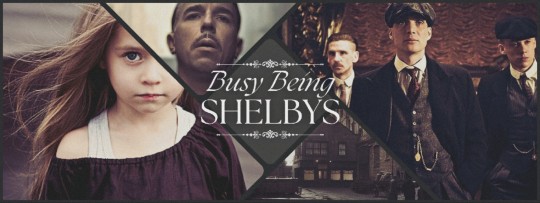
[1919] Garrison Lane, Birmingham.
In the shadow of giants, six year old Lydia Shelby proves that courage comes in all sizes.
[Part of The Lydia Saga]

The cobbled streets of Small Heath were alive with the sounds of a bustling day, a cacophony that painted a vivid picture of daily life in this vibrant part of Birmingham. Market vendors bellowed their wares from behind wooden stalls, their voices competing with one another in a bid to attract customers. Freshly baked bread, ripe fruits, and an array of colourful fabrics were just some of the treasures on display. The air was thick with the mingling scents of fresh produce, roasted meats, and the occasional whiff of coal smoke from a distant factory.
Children darted through the maze of adults, their laughter ringing out like the sweetest music. They played games of tag and hide-and-seek, their joy unburdened by the worries of the adult world. The rhythmic clip-clop of horse-drawn carriages added a steady beat to the day's soundtrack, while the faint clink of glasses and the murmur of conversation drifted from the open door of the Garrison Pub, where patrons sought respite and camaraderie.
Among the children was Lydia Shelby, a striking figure with her bright blue eyes and unruly dark hair that framed her face in wild, untamed waves. She was a miniature replica of her older brothers, though her features still retained the softness of childhood that had long since been etched away by the harsh realities of life for her siblings.
Lydia was lost in her game of hopscotch, her delicate leather shoes tapping out a rhythmic pattern against the uneven cobblestones. Each leap and skip seemed to lift her further into a world of her own making, where the only things that mattered were the chalk-drawn squares and the simple joy of play. Her giggles rang out like tiny bells, echoing down the narrow street and adding a layer of innocence to the otherwise gritty surroundings.
The market's vibrant noise began to fade as an unspoken tension gripped the air. Conversations stilled, and the clatter of commerce dulled to a murmur. Heads turned and eyes widened as a sleek black car, polished to a mirror shine, rolled to a stop in front of the Garrison Pub. The vehicle, an imposing presence amidst the horse-drawn carts and pedestrian traffic, seemed to absorb the light, casting an eerie shadow over the cobblestones.
A hush fell over the street, the silence broken only by the creak of the car door as it opened. Billy Kimber emerged first, his sharp suit impeccably tailored, accentuating his lean, muscular frame. His eyes, cold and calculating, swept across the scene with the precision of a hawk. He moved with the confidence of a man who knew he commanded respect, his very presence a silent threat.
Behind him, his men followed, each one a mirror of their leader’s predatory demeanor. They fanned out, creating a semi-circle that seemed to cordon off the area, their eyes scanning for any sign of the Shelbys. Kimber's face was a mask of determination, his jaw set as he prepared to confront his rivals. The air seemed to thicken with each step they took, the tension rising like a gathering storm.
Lydia, oblivious to the shift in the atmosphere, continued her game. Her small figure, clad in a simple dress, darted from square to square, her laughter a stark contrast to the growing unease that enveloped the street. She was a picture of pure, untainted joy, her world still untouched by the darker elements that lurked in the shadows of Small Heath.
Kimber’s gaze landed on Lydia, his eyes narrowing slightly.
Lydia looked up from her hopscotch grid as the long, dark shadows of Kimber and his men fell over her game, casting a chill despite the warm day. Her bright blue eyes blinked up at the unfamiliar faces, her expression more curious than afraid. Her unruly hair bounced as she straightened up.
Billy Kimber, sensing the girl's defiance, allowed a slow, amused smirk to spread across his face. He crouched down slightly, bringing his sharp, predatory eyes level with Lydia's. "Well, well, what do we have here?" he drawled, his voice dripping with condescension. "A little girl all alone."
Lydia’s eyes narrowed slightly, her stance shifting as she planted her small hands firmly on her hips, a stance that was unmistakably Shelby. Despite her tender age, there was a steely resolve in her gaze, a flicker of the same fire that burned in her older brothers. She tilted her chin up defiantly. "I'm not alone," she said firmly, her voice steady and clear. "My brothers are inside."
Her unwavering gaze unsettled some of Kimber's men, their eyes darting between the girl and their leader. But Billy Kimber was not so easily intimidated, especially not by a child. He crouched down to her level, his eyes narrowing to scrutinize her more closely. "Do you know who I am, little girl?" he asked, his voice a low growl that usually elicited immediate submission.
Lydia nodded without hesitation. "You're Billy Kimber," she stated simply, her tone devoid of the fear that usually accompanied his name. "You run the races."
Kimber's smirk widened, a predatory gleam in his eyes. "That's right. And do you know why I'm here?"
Lydia shrugged, a gesture so casual it bordered on insolent, her small shoulders lifting and falling as if to say that his presence was of little consequence to her. "You're probably looking for my brothers. But they're busy."
One of Kimber's men chuckled, but it was a nervous, hesitant sound, the laughter of someone unsure whether to be amused or alarmed. Kimber's smirk faltered for a moment, replaced by a flicker of irritation. He was accustomed to fear and respect, not this calm defiance from a mere child. "Busy with what?" he asked, his patience thinning, his tone sharper now.
Lydia’s eyes met his unflinchingly, her voice carrying an edge of pride. "Busy being Shelbys," she replied, as if that explained everything. And in a way, it did.
Kimber's eyes darkened, his amusement giving way to a simmering menace. He extended a hand, intending to ruffle Lydia's hair in a gesture meant to assert his dominance rather than convey any genuine affection. His fingers, adorned with rings that gleamed ominously in the daylight, reached towards her.
But before he could make contact, Lydia took a deliberate step back, her eyes locked onto his with a mixture of defiance and warning. The movement was subtle, yet it spoke volumes. Her small frame seemed to grow taller, her presence more commanding, as if channeling the collective strength of her family.
"You shouldn't touch me," she said softly, her voice steady and clear. The softness of her tone contrasted sharply with the steel in her words. "My brothers wouldn't like it."
Kimber's hand hung in the air for a moment, frozen by the quiet authority in her voice. He slowly retracted it, his fingers curling into a fist at his side.
At that moment, the door of the Garrison swung open with a force that made the hinges groan in protest. Out stepped Thomas Shelby, flanked by Arthur and John, their presence immediately commanding the attention of everyone in the vicinity. The three brothers moved with a lethal grace, their expressions murderous, their postures taut with barely contained fury. The atmosphere grew dense with a palpable tension, forewarning of the storm that was about to break.
"Kimber," Tommy began, his voice slicing through the air like a blade of cold steel. "What the fuck do you think you're doing?" Each word was enunciated with an icy precision that sent shivers down the spine of anyone within earshot.
Billy Kimber straightened up, attempting to reclaim his swagger now that he was facing adults. His sneer was a thin veneer over the unease that gnawed at him. "Just having a chat with your little sister, Tommy," he said, his voice carrying a faux lightness that did nothing to mask the underlying threat.
Tommy's gaze turned to ice, his eyes narrowing with a deadly calm. He took a deliberate step forward, closing the distance between them. The intensity of his stare was enough to make even the bravest of men falter. "Keep away from her, get back in your fucking cars, and leave," Tommy said, his tone a low, menacing growl that left no room for misinterpretation.
Kimber laughed, but it was a hollow sound. He knew better than to push his luck with the Shelbys. "I'll see you soon, pikey," he said, but there was no real conviction in his words. With a sharp gesture, he signaled his men to follow him back to the car.
As the car sped away, its engine roaring and tires screeching, a cloud of dust hung in the air, slowly settling back onto the cobblestone street. The square, which had been a tense battleground moments ago, began to return to its usual hustle and bustle, though an undercurrent of unease still lingered.
Lydia stood frozen for a moment, watching the black car disappear around a corner. The adrenaline that had surged through her tiny frame started to ebb, leaving her legs shaky and her heart pounding in her chest. Her earlier bravado was giving way to a wave of relief.
She turned and ran to her brothers, her small feet making soft, rapid taps against the cobblestones. Tommy, Arthur, and John watched her approach, their expressions softening in unison. Tommy crouched down just as Lydia reached him, and with a gentle but firm grip, he lifted her into his arms. He pressed a tender kiss to her forehead, feeling the rapid beat of her heart against his chest.
"Good girl, Lydia," he murmured, his voice a soothing balm against the tension that still clung to the air. "You did us proud,"
Lydia's lips curved into a small, proud smile as she wrapped her arms around Tommy's neck, seeking the comfort and security that only her brothers could provide. She rested her head on his shoulder, feeling the steady rise and fall of his breath. "I know," she said confidently, her voice a mix of lingering fear and newfound courage. "I was brave, just like you."
The sun dipped lower on the horizon, casting an amber glow over Small Heath as Tommy took one last vigilant sweep of the streets for any lingering danger. Satisfied, he turned and carried Lydia towards the Garrison, Arthur and John close behind. As they stepped inside, the familiar scent of whiskey and smoke enveloped them. Lydia, nestled in Tommy's arms, exchanged a glance with John, who walked just behind them. She smiled, a mix of relief and affection, and John responded with a warm grin, ruffling her hair gently. Inside the Garrison, with the comforting hum of conversations and clinking glasses around them, the weight of the day's tension began to lift, leaving them with a fleeting sense of tranquility.
#peaky blinders#peaky blinders fanfiction#peaky blinders oc#lydia shelby#billy kimber#john shelby#arthur shelby#peaky blinders fic#shelby oc#peaky blinders fanfic
95 notes
·
View notes
Text

Nearly as soon as the Bolsheviks took power, they began to execute anarchists and Socialist Revolutionaries, most of whom had fought alongside the Bolsheviks in the Revolution. They also purged elements of their own party deemed "anti-Soviet" or "counter-revolutionary." This state repression was well documented by the Soviet government, but here we have chosen to use journals and letters of those affected. Lithuanian-American Jewish anarchists Emma Goldman and Alexander Berkman describe the Bolshevik betrayal: The systematic man-hunt of anarchists [...] with the result that every prison and jail in Soviet Russia filled with our comrades, fully coincided in time and spirit with Lenin's speech at the Tenth Congress of the Russian Communist Party. On that occasion Lenin announced that the most merciless war must be declared against what he termed "the petty bourgeois anarchist elements" which, according to him, are developing even within the Communist Party [...] On the very day that Lenin made the above statement, numbers of anarchists were arrested all over the country, without the least cause or explanation. The conditions of their imprisonment are exceptionally vile and brutal. (Boni, 253)
#anti-bolshevism#anti-leninist#anarchism#anti tankie action#crimethinc#emma goldman#alexander berkman#communism#marxism leninism
82 notes
·
View notes
Text
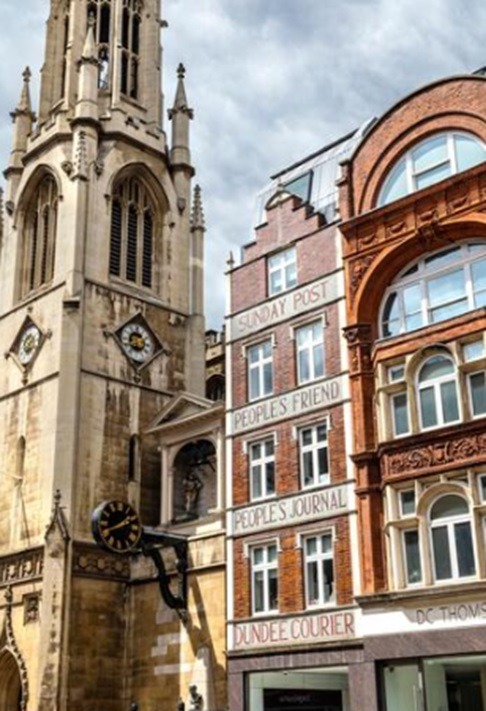
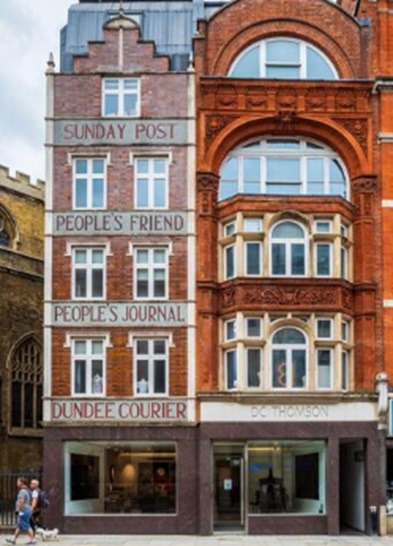
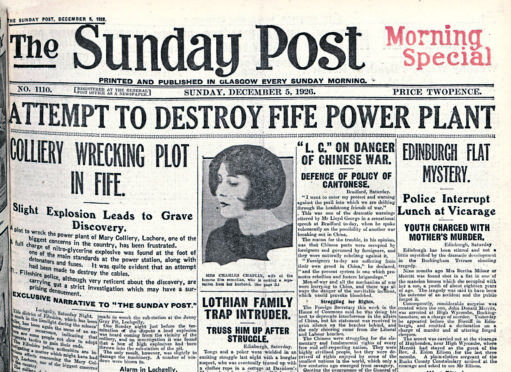
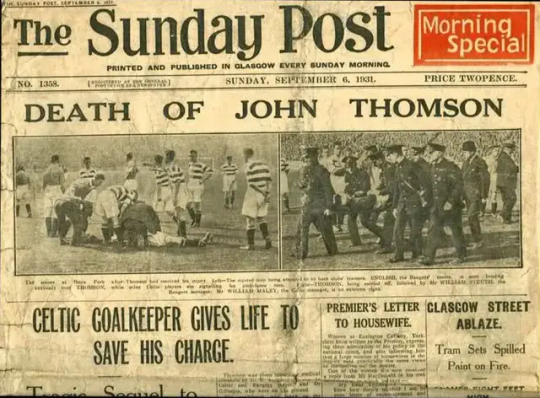
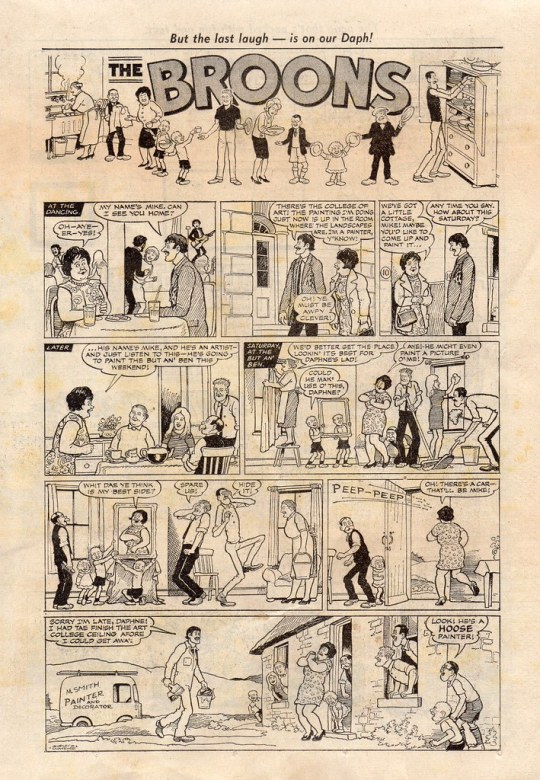
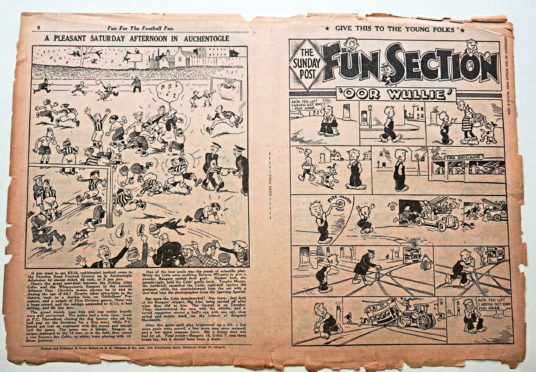
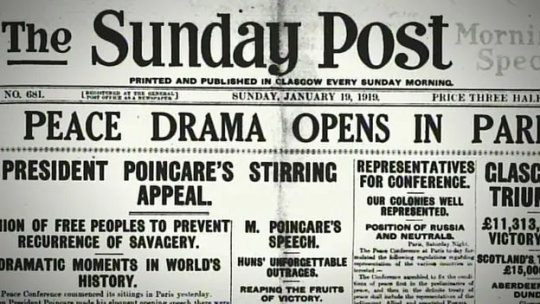
On 19th January 1919 The Sunday Post - home of the 'Broons' & 'Oor Willie' made its first appearance.
The Sunday Post, the Scottish family newspaper was once named the most successful in the world by the Guinness Book of Records.
The paper was the creation of DC Thomson, the family firm behind the third J in Dundee's famed trio of jute, jam and journalism.
It was born out of a thirst for news brought on by the outbreak of World War One, as many local men headed off to fight on the front lines.
The Thomson family had made their fortune in the international shipping industry before branching out into publishing with the purchase of the Dundee Courier and Argus in 1866.
In 1884, 23-year-old David Coupar Thomson was put in charge of the family's growing publishing interests, and in 1905 DC Thomson and Company was set up to publish newspapers.
Although it was home to the daily Courier and Evening Telegraph titles, at the outbreak of war DC Thomson didn't have a Sunday paper.
So to serve the insatiable daily appetite for news of the war effort, a special Sunday edition of the existing Saturday Post was established in 1914.
The fourth battalion of the Black Watch was Dundee's own regiment, and was made up primarily of men who had worked in the three Js - including hundreds from DC Thomson.
With many of their own men serving in the trenches, the firm's newspapers were ideally placed to report on the war, with eye-witness accounts from the "fighter writers" sent back from foreign battlefields.
Even David Thomson himself took his chauffeur and car across to France to visit the front and send back reports.
The "Sunday Special" edition was intended to last for the duration of the war.
But the strength of its journalism and appeal was such that it continued on as a fully-fledged paper of its own, with the first edition of the new Sunday Post hitting the streets on 19th January 1919.
Despite falling out with some socialists when Thomson cracked down on trade union membership after the General Strike of 1926, the Post grew to become one of the country's most popular papers.
Perhaps in response to the collapse of the jute industry at the turn of the "Hungry Thirties" and a depression which saw unemployment in Scotland soar to 28%, the Post launched a "fun section" which produced the paper's most enduring characters.
Created by artist Dudley D. Watkins, Oor Wullie and the Broons made their debut in the first fun section in March 1936, and have been there ever since.
Every Scot was/is aware of Oor Wullie, through the Post, through his Christmas annuals, everybody knew it, 'Jings, crivvens, help mah boab' became part of the Scottish language, part of the dialect. How many of us have used the words ourselves? It is as much a part of our language as the age old favourite "Och Aye the Noo!"
The characters even got involved with the war effort when World War Two broke out in 1939, with Wullie setting up a shy featuring images of Hitler and other Nazi leaders instead of coconuts and Hen and Joe Broon enlisting.
Throughout the war, the Sunday Post became known for giving equal prominence to the headlines of the day and stories and appeals from local people.
Examples include a plea from a Clydeside mother of four for a safe place to take her children during the Blitz, and letters from wives and mothers trying to track down their loved ones.
The paper also campaigned fiercely on behalf of its readership - one long-running campaign targeted large stores of whisky in built-up areas, which it was feared could cause huge explosions if hit by a bomb.
Eventually the editor of the paper was called to London to talk to ministers, and the warehouses were moved to outlying areas. A lot of the whisky was actually moved to Canada, and one of the ships carrying it ran aground off Scotland, and became the source of Compton Mackenzie's famous 'Whisky Galore' - so you can thank the Sunday Post for that.
By 1935 the paper's circulation had grown steadily to 350,000, but in the post-war years it exploded - by the turn of the 1980s it was estimated six out of ten adults in the country were readers.
At its peak the paper was named in the Guinness Book of Records as the most-read paper in the world in its circulation area, with more than 1.7m copies sold every week in a country of five million people.
However, those glory years are long gone. Competition from television, the internet and an increasingly saturated newspaper market have seen the Post's circulation dropping to just under 143,000 in December 2016, with a year-on-year fall of 13.5% recorded for 2016.
In 2014 a weekly magazine supplement was reintroduced. Called IN10, it features entertainment, food, homes, gardens, travel and books as well as The Sunday Post's man in Hollywood, Ross King.
And despite sales being a shadow of their 1980s heyday, the Sunday Post is still as relevant as ever, although newspapers in print all over the country are in decline and I wonder how long some can survive......
25 notes
·
View notes
Note
What are your thoughts on Police Unions and calls to have them thrown out of the AFL CIO?
The last time that police unions actually acted like unions was the Boston police strike of 1919 (that unfortunately catapulted Cal Coolidge into national political prominence). After that, the basic labor relations between the state and police unions began to change in ways that are not recognizable as standard trade unionism.

The shift really began in the 1930s, when the rise of industrial unionism and attendant strike activity scared the shit out of the employers and their allies in government, because the usual Pinkertons and American Legion thugs were not enough to keep a lid on the situation. Hence the need to keep the police unions on the side of the employers rather than allow any possibility of siding with the strikers - thus you start to see police unions getting easily recognized, wage increases getting thrown around like candy, anything to keep the strikebreakers sweet.
However, it particularly morphed during the Second Great Migration (1940s through 1970), when the sudden emergence or at least rapid expansion of black populations in Northeastern, Midwestern, and Western cities scared the shit out of the municipal establishment in similar, yet distinct ways than the earlier union uprising had. In this period, an informal understanding was reached that the elected officials would block, slow-walk, or otherwise frustrate attempts by activists to impose accountability on police through civilian complaint review boards and other mechanisms, in exchange for police making upholding the racial hierarchy one of their enforcement priorities.
The expansion of grievance and arbitration procedures to include shootings and other acts of police brutality, written reprimands and other punishments from management, civilian complaints of abuse of power, officers' misconduct records and the extent to which they could be made public or even shared with future employers - the whole intricate mechanism by which police union contracts were turned into a bulwark against accountability - was part of this quid-pro-quo alliance between the state and police in the face of the emergent civil rights movement.
That's part of what slightly gives me pause about the left critique of police union contracts, because I think this alliance would have been constructed, maintained, and expanded over the decades whether or not police were unionized. The means would have been different, probably exercised through city charters, local ordinances, judicial precedents (even more so), but the ends would be the same. And if activists actually managed to eliminate a police union contract today, I'm absolutely confident that municipal government would rebuild it the next day, because they're absolutely scared of police slowdowns.
As to chucking them out of the AFL-CIO, it's not a bad thing per se, but I do want people to understand that it would be purely symbolic. The AFL-CIO is a union federation, it doesn't really have much in the way of direct authority over member unions, or exclusive access to resources that outpace what the member unions have. To give a historical example, the AFL-CIO expelled the Teamsters back in the 50s for being mobbed-up and it didn't change the Teamsters one bit - they kept on being mobbed-up until the Teamsters for a Democratic Union challenged the Hoffaites in the 70s and the Justice Department went after them with RICO charges in the 80s.
426 notes
·
View notes
Text
This is not a political post
One more time, in caps and bold: THIS IS NOT A POLITICAL POST. But if I can, as a diplomat and a historian, bring some extra context and try and understand what happened today in S's world, so be it. Enough said about me.
I am fumbling with a ton of thoughts since this morning, when this link was shared with me by one of the closest people in my platoon:
In a nutshell: S signed that (in)famous letter, an initiative of APUK (Artists for Palestine UK), a network that's been operating since 2015. You can read it in full if you open the link and I suggest you do. You will soon find out that the letter, while correctly pointing out the atrocious gesture of bombing a civilian hospital in Gaza, asked the world's governments to 'end their military and political support for Israel’s actions'. Nowhere in that letter did the word Hamas appear, which would immediately point out as supporting what is a terrorist movement that is, alas, also part and parcel of the Palestinian government, under Mahmoud Abbas's weak, irrelevant aegis. The man is an old PLO/Fatah crone: fishy, ineffective and fairly corrupted. His position on the Holocaust is, to be elegant, a study in ambiguity. Enough said.
It is pointless and absurd to try and explain the whole situation in detail. I would have to go back at least to the Balfour Declaration (1919) or the no less infamous end of the British/LoN/UN Palestine Mandate (1948), if I wanted to simply scratch the surface of a subject that is everywhere these days. With an intensity of absolutely legitimate emotions that can simply not be measured by any counter on this planet, as we speak.
But the facts are here, and naïve S had no damn idea: 500 civilians were killed, Tuesday night, in the bombing of the al-Ahli Baptist/Arab Hospital in Gaza City. Hullaballoo ensued on a cataclysmic scale: first, Hananya Naftali, a digital aide to Benjamin Netanyahu recklessly wrote on X that the "Israeli army [Tsahal] bombed a Hamas terrorist base inside a hospital in Gaza". Then erased the tweet. Several video collages released by the Tsahal, the first of which was heavily contested by a NYT journalist (and former Bellingcat researcher) Aric Toler, point out towards the PIJ (Palestinian Islamic Jihad)'s forces being responsible for the strike.
These quotes from an Al Jazeera paper sum up the ensuing scandal better than I ever could - selected by me, but you can and probably should read it all (https://www.aljazeera.com/news/2023/10/18/what-is-israels-narrative-on-the-gaza-hospital-explosion):


No craters mean no airstrike and most probably a rocket failure. The uneasiness remained, that being said, at the highest level. And the planned US-Egypt-Jordan- Palestine talks hosted by Amman were abruptly called off hours before Biden landed in Tel Aviv.
To cut the story short: the letter is right to point out that you just don't bomb hospitals when you are at war, as per the terms of the Fourth 1949 Geneva Convention, dealing with the protection of civilians in times of war. Both Israel (signed in 1949/ratified in 1951) and Palestine (2014) are, as parties and signatories, legally bound by it, in the eyes of International Law. The only problem with it is that it purposefully omits to put things into context (whodunnit) and forgets the cynical truth: Hamas keeps hundreds of innocent Israelis and two millions of innocent Gaza civilians as its hostages.
Article 18 is at the core of the matter:
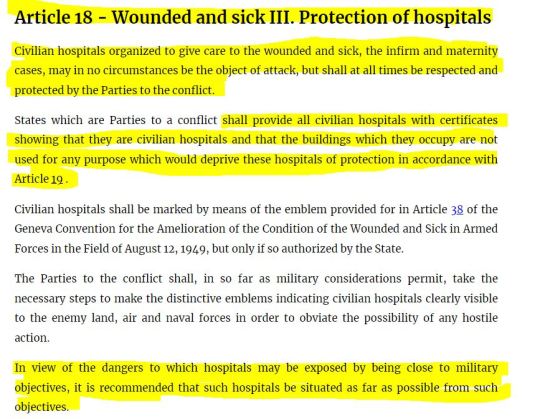
The last thing S should have done is to sign that fucking treacherous letter, without getting a second (third, fourth...) opinion.
S is a good man, we all know and love this about him. He is also one of the most naïve people I have ever seen in this lifetime. This is why his final reaction really, really moved this cynic, here:
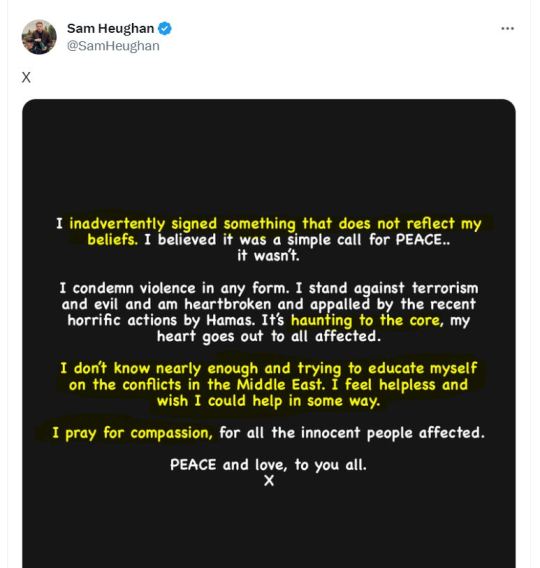
I am taking this home and keep it. It deeply moved me (yes, me):
" I don't know nearly enough and trying to educate myself on the conflicts in the Middle East. I feel helpless and wish I could help in some way.'
I am sure 'someone nice' called and 'nicely asked", maybe even offered some scarce and biased details, to prompt an impulse signature. I am also sure S didn't read the letter himself. There is no harm saying you were wrong. He did it with dignity and grace - no, it was not easy.
This is a man of worth speaking. Bravo!
But for the love of all that's holy, Sir: don't you ever step into this kind of shit again. These things are far more complex than you could ever fathom and it's a very cynical world out there. Leave it to us, we are handsomely paid for it by our governments. I hear you and I am completely supporting this more than welcome withdrawal. It's not worth much, for sure. But it is an honest POV.
Also, John 8:7:
So when they continued asking him, he lifted up himself, and said unto them, He that is without sin among you, let him first cast a stone at her.
Kindly refrain from politics in your comments. Let's not drag trash where it should not be, ever. Thank you all.
213 notes
·
View notes
Photo
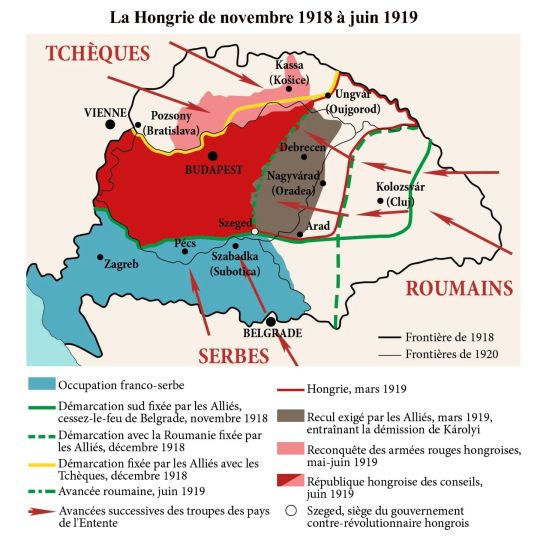
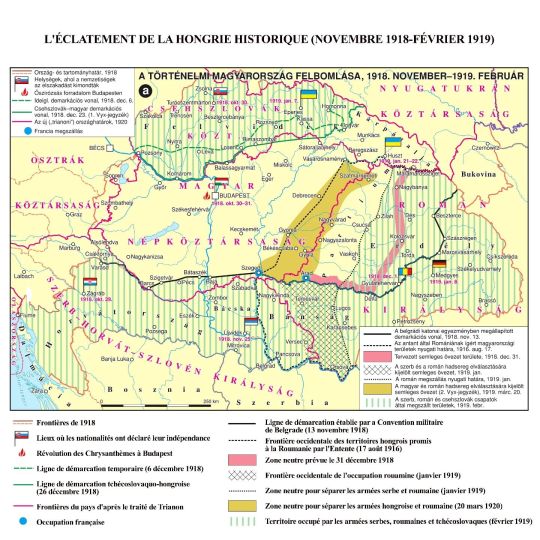
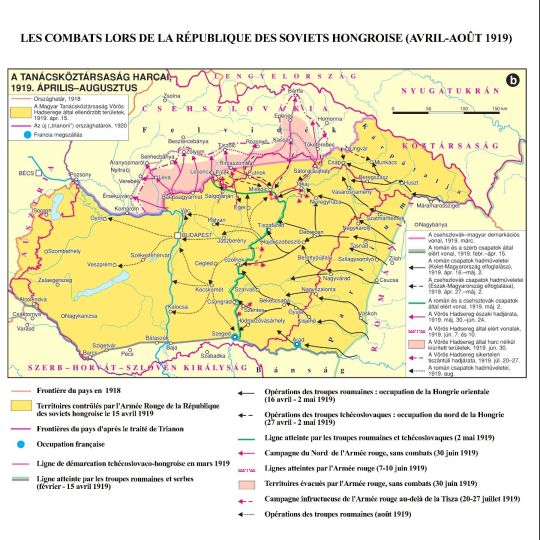
Hungary in 1918-1919
Nicolas de Lamberterie, 2020
"Történelmi atlasz - Középiskolásoknak", József Kaposi, 2016
by cartesdhistoire
Defeats on the front, rising prices, and the agitation of foreign peoples created a troubled situation in Hungary, and in January 1918, a general strike paralyzed activity in Budapest. At the instigation of certain former Hungarian prisoners freed from Russia by the Treaty of Brest-Litovsk and converted to Bolshevism, mutinies took place, and a new general strike of a political nature extended to the entire country on June 20.
On the night of October 29 to 30, Count Mihály Károlyi became the head of government of a de facto independent Hungary: it was the Aster Revolution which established the Hungarian Democratic Republic (November 16).
The head of the inter-allied military mission, the Frenchman Fernand Vix, demanded a retreat of the Hungarian armies by 100 km, an ultimatum which led to the fall of Károlyi and the formation of a government in the hands of the journalist Béla Kun, who had returned from Russia where he had been a companion of Lenin: the Hungarian Soviet Republic was proclaimed on March 21. To face the armed offensives of its neighbors, the government formed a People's Army which, after some successes against the Czechs, was defeated by the Romanians who advanced on Budapest. Béla Kun left the capital on August 1, two days before the arrival of Romanian and Serbian troops supported by French forces (missions led by Berthelot and Franchet d'Espèrey, respectively).
The Bolsheviks' rise to power was poorly received in the provinces and among the Allies. In the southeast of the country occupied by French troops, a national government was formed in June in Szeged whose army was entrusted to Admiral Horthy who, at the time of Béla Kun's fall, already controlled the entire South and West of the country. After negotiating the departure of the Romanians with the Entente, Horthy entered Budapest at the head of his army on November 16. The assembly elected him regent of Hungary on March 1, 1920.
51 notes
·
View notes